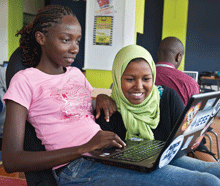Economic Empowerment
Source: IMF
Up to the moment when Edna Sakwa, 22, walked into the offices of AkiraChix in downtown Nairobi, she had barely touched a computer. Her lack of tech savvy meant she was puzzled when she first heard the acronym “IT” for information technology.
As a young high school graduate living in the slums of Nairobi, her prospects were bleak.
“I come from a very humble family and when I finished high school there was no money to take me to college,” she said.
Edna’s lucky break came when AkiraChix—a small IT start-up—scouted her, along with a number of other girls, to participate in their training program, designed to prepare young women for a career in the high tech industry.
Training the AkiraChix way
AkiraChix has emerged at breathtaking speed. In the year and half since it was first established by a small group of 12 females meeting regularly to network, it has coalesced into a tightly run organization providing training, mentoring, and internship opportunities for high school girls in the field of information technology.
AkiraChix targets bright girls from poor families who can’t afford university. In the first months of the NGO’s creation, so limited were AkiraChix’s funds that the founding members dug into their own pockets for bus money to enable girls to get to class.
Initially, classes were held in a bus until a donation from a nongovernmental organization enabled the company to rent a room.
In the past few years, the use of mobile telephones has risen dramatically in Kenya, alongside growing access to the Internet. The IMF expects the country’s economy to grow by 5 percent this year.
Much of that growth will be powered by the boom in the IT industry. Many young Kenyans are flocking to this promising sector to take advantage of emerging job and business opportunities, but the field is still very much dominated by men.
Rebalancing the field
Initially Edna was discouraged by the gender imbalance. The attitude of some of her peers didn’t help. They told her “It’s a tough course. It’s only meant for boys—the bright boys,” she recalls.
The creation of AkiraChix lies in a sense of outrage and a determination that women should make their presence known in this field. In 2010, after a meeting of IT experts organized for the launch of iHub, a Nairobi-based IT center, the 12 founding members of AkiraChix, including Judith Owiga, Linda Kamau, and Marie Githinji, marked the appallingly low turnout of females and decided “Okay, we are going to do something about it,” reminisces Owiga.
They settled on the name AkiraChix, meaning intelligent women. Two weeks later, they had a website and a blog. The small group quickly became known and they were hit by a wave of project requests from enthusiastic tech entrepreneurs.
The positive response triggered them to narrow the focus of their action to what they believe is a better long-term solution for the industry: showing young girls that the IT industry is not just a man’s world.
Today, about 30 girls are selected each year to participate in AkiraChix training. Over 12 months, they are taught computer skills from word processing to computer programming, through web design and lessons in entrepreneurship.
Upon graduation, the girls are qualified to apply for a wide range of jobs or create their own products.
Some have even gone on to start their own businesses.
Dynamic start-ups, innovative solutions
Graduates have participated in dynamic start-ups and innovative solutions including the award-winning M-farm mobile app created by Susan Oguya and Jamila Abass, two of the co-founders of AkiraChix whom you can see in the cover photo of Finance & Development magazine’s December 2011 issue.
In a country where 99 percent of the people access the Internet through their mobile phone, this app enables farmers to check market prices, access virtual group buying, as well as connecting them to buyers—all at a touch of a mobile telephone. Other former trainees have participated in the creation of Uhasibu, a web and mobile cloud-based accounting system.
“Our target is to expand in the whole of Africa. We want to be a revolution for African women in technology,” says Owiga. “That is our big vision.”
AkiraChix’s latest project is the mobile garage, a bus that will tour Kenyan universities to offer training and fill the IT knowledge gap among female university students, and to spread the AkiraChix gospel. Edna might be counted as an AkiraChix convert.
“God bless them abundantly! If it were not for them, I don’t know where I could have been,” she says.
These days, between preparing to go to university and volunteering at a youth group, Edna interns as an assistant developer for Frontline SMS on a salary of $50 a month.
Not much to some, but a step in the right direction for a girl who, a year ago, did not even know how to use a computer.

